#also more inclusive character options regarding race and ethnicity
Explore tagged Tumblr posts
Text
it’s sort of beautiful how stardew valley, a game made by a straight/cis man that is fairly heteronormative in a lot of ways, has become so beloved by queer people because of the few ways concerned ape chose to be inclusive. the fact that you can marry any marriage candidate as either gender was huge for me as a kid. the fact that several marriage candidates get special dialogue depending on if you’re a male or female farmer is really great, ca didn’t have to do that but he did. also, ca has completely embraced the modding scene, stating that one of the main goals of 1.6 was to make modding easier, which is an implicit acknowledgment that if there are parts of the game’s content that you wish were different, he himself supports you with open arms.
yeah, most of the writing itself is fairly hetero focused (and white, for that matter). all the pairs at the flower dance are hetero whether it makes sense or not, there’s no in game gay couples unless you yourself choose to marry the same gender, and any references to relationships in the game not focused on your farmer are almost always heterosexual, not to mention there’s really not a lot of genderqueerness period in the game. but honestly, i’m not too beaten up over it. i imagine ca probably wanted to stay in his lane while being as inclusive as possible, which i think he more or less succeeded at. i mean, no matter which way you slice it, this game is so meaningful to me as a gay boy and it probably always will be. the slight blemishes on the queerness of the game certainly don’t outweigh that for me.
#stardew valley#i feel even stronger about this knowing how many content mods there are that diversify the game#with real acknowledgments of queer gender and sexuality#also more inclusive character options regarding race and ethnicity#the creator of the game may have his own limited perspective as we all do#but there’s still so much room to let this game be exactly how you want or need it#maybe i’m just optimistic or have rose colored glasses cuz i love this game so much#but still i think it’s just really nice
10 notes
·
View notes
Text
just an insight on what writers have to deal with in regards to inclusivity for everyone:
I’ll start off by saying I’m obvi hiding their username for anonymity but I just wanna show yall what it’s like to be a writer these days on tumblr 💀
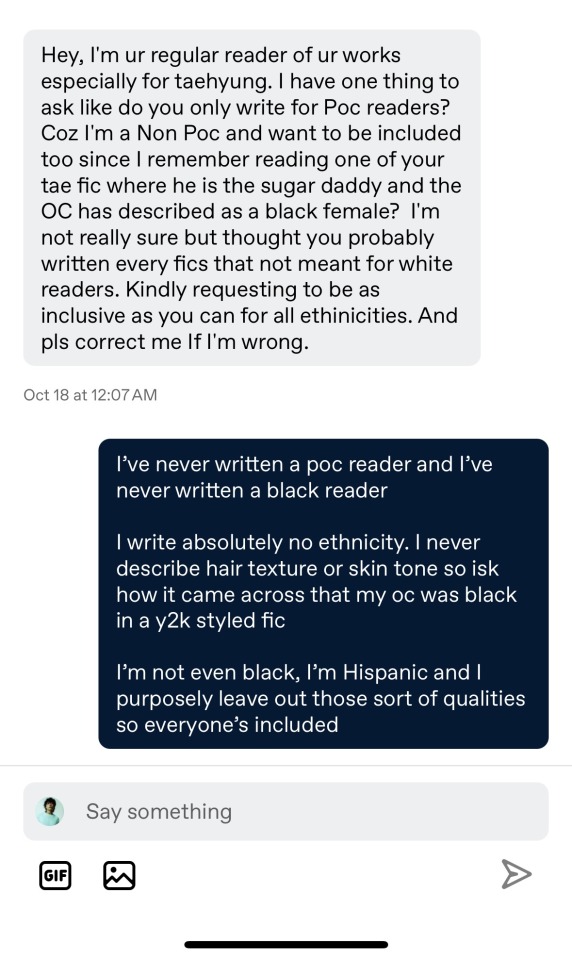
I’ve never explicitly said my writing is only for poc or only for white. I purposely try and leave that out of my writing bc I want everyone to feel included. the sugar daddy fic this user is referring to is I believe Lace & Luxury where I never once said it was a black character. does this mean I would never write a black/poc character? ofc not, it just means that I don’t specify race/ethnicity, etc or how will it be inclusive for all? and the immediate jumping to conclusions bc a character in my fic has y2k style or bc of a moodboard pic [of a white person with a heavy tan I found off pinterest] leads the idea that it’s poc is weeeiiiiirrrrrddddd bc even if it was, i don’t see how it would be such a problem to read the tags
if anything I feel like there should be MORE writing for poc
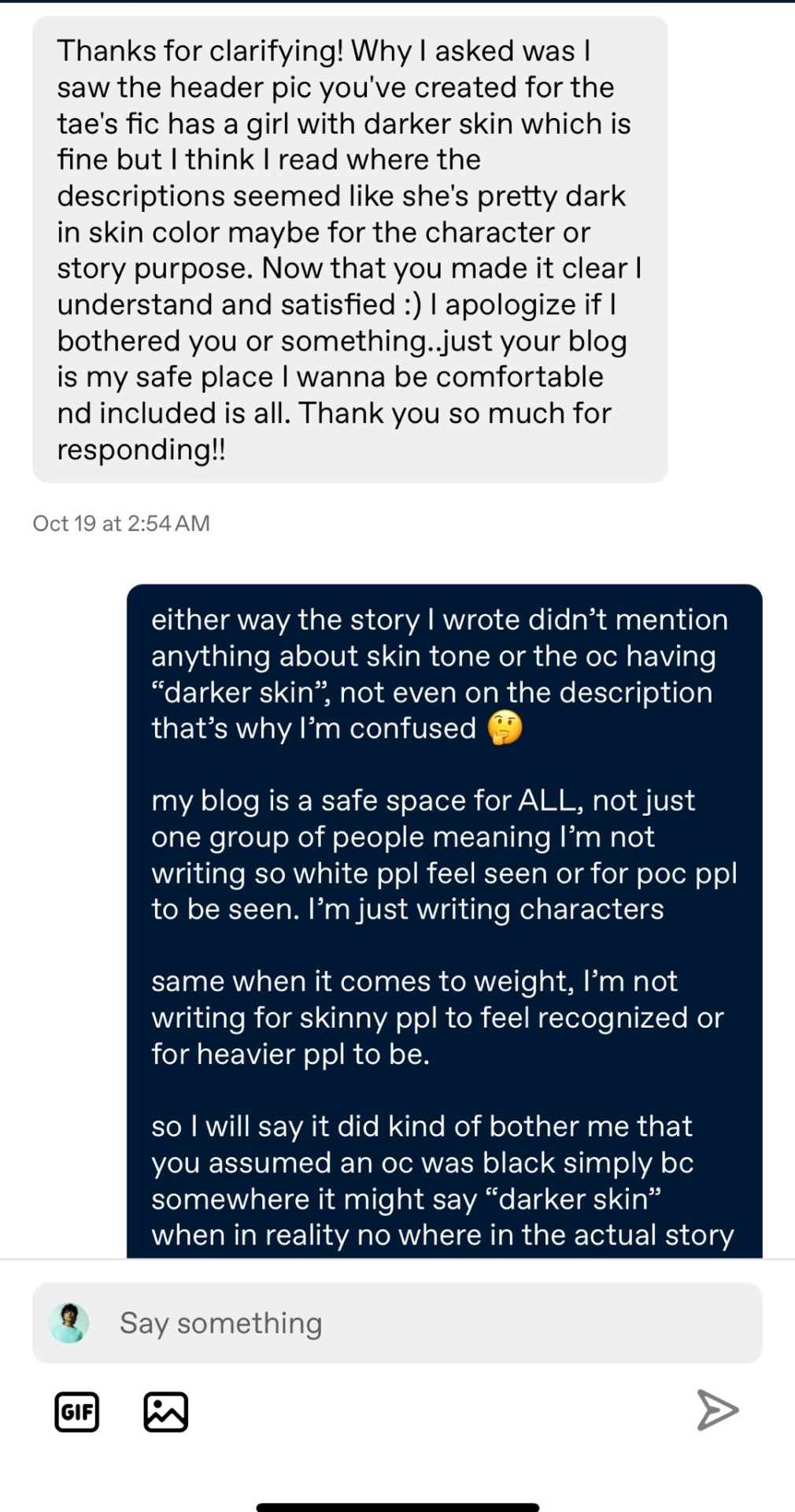
this person is talking about wanting “inclusivity” but they’re upset that a character might be a poc or overweight bc it doesn’t describe them?
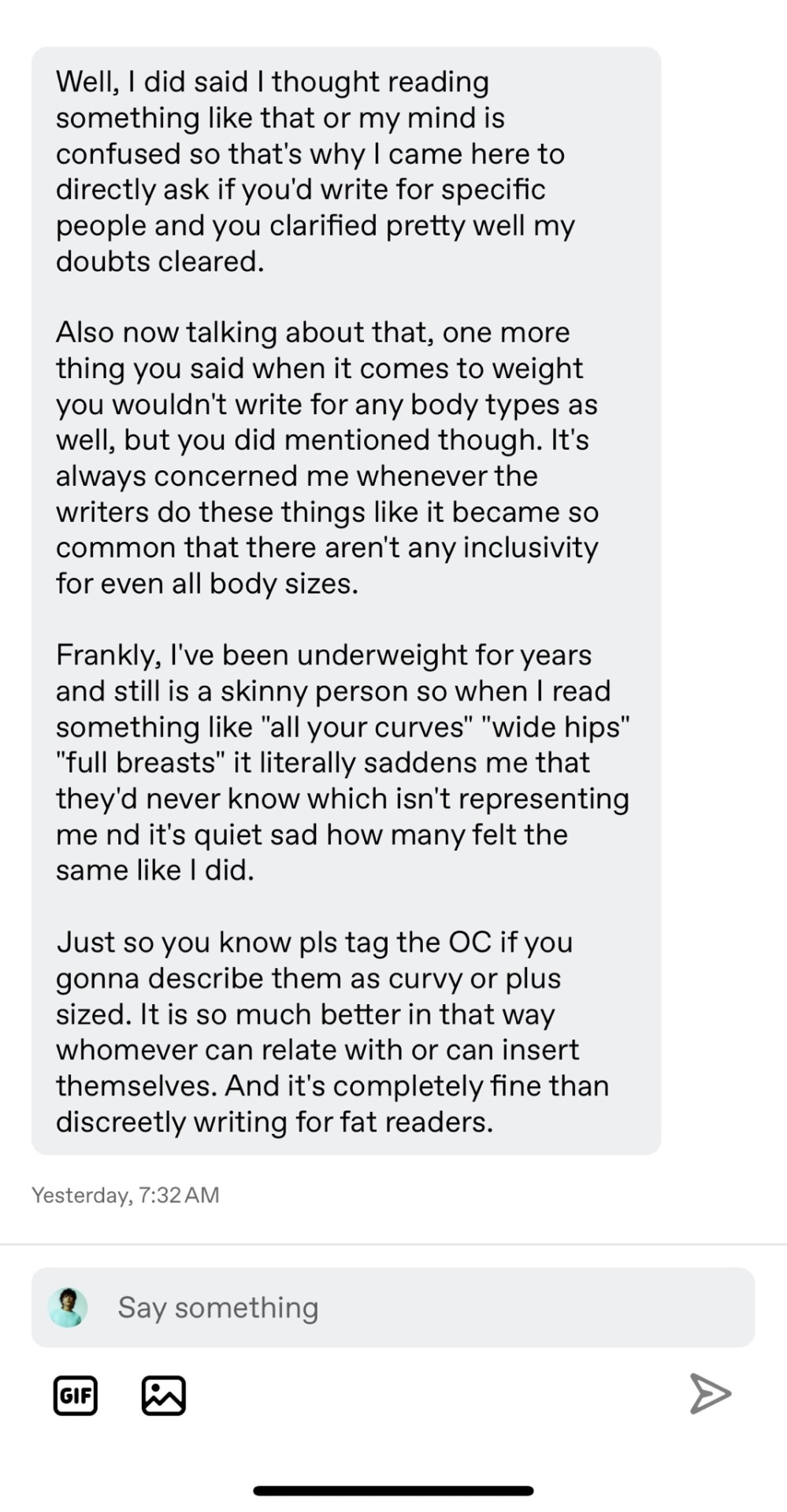
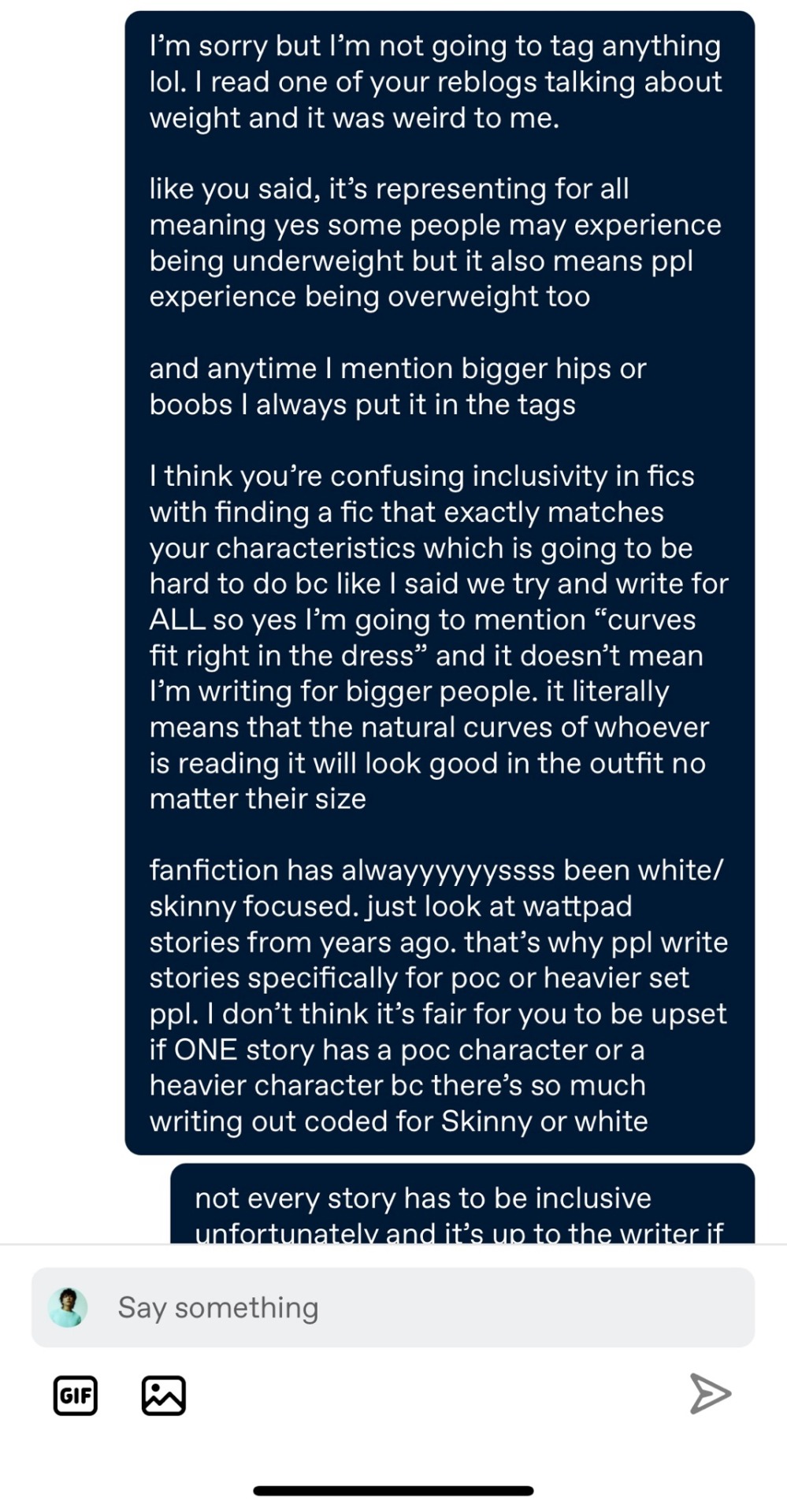
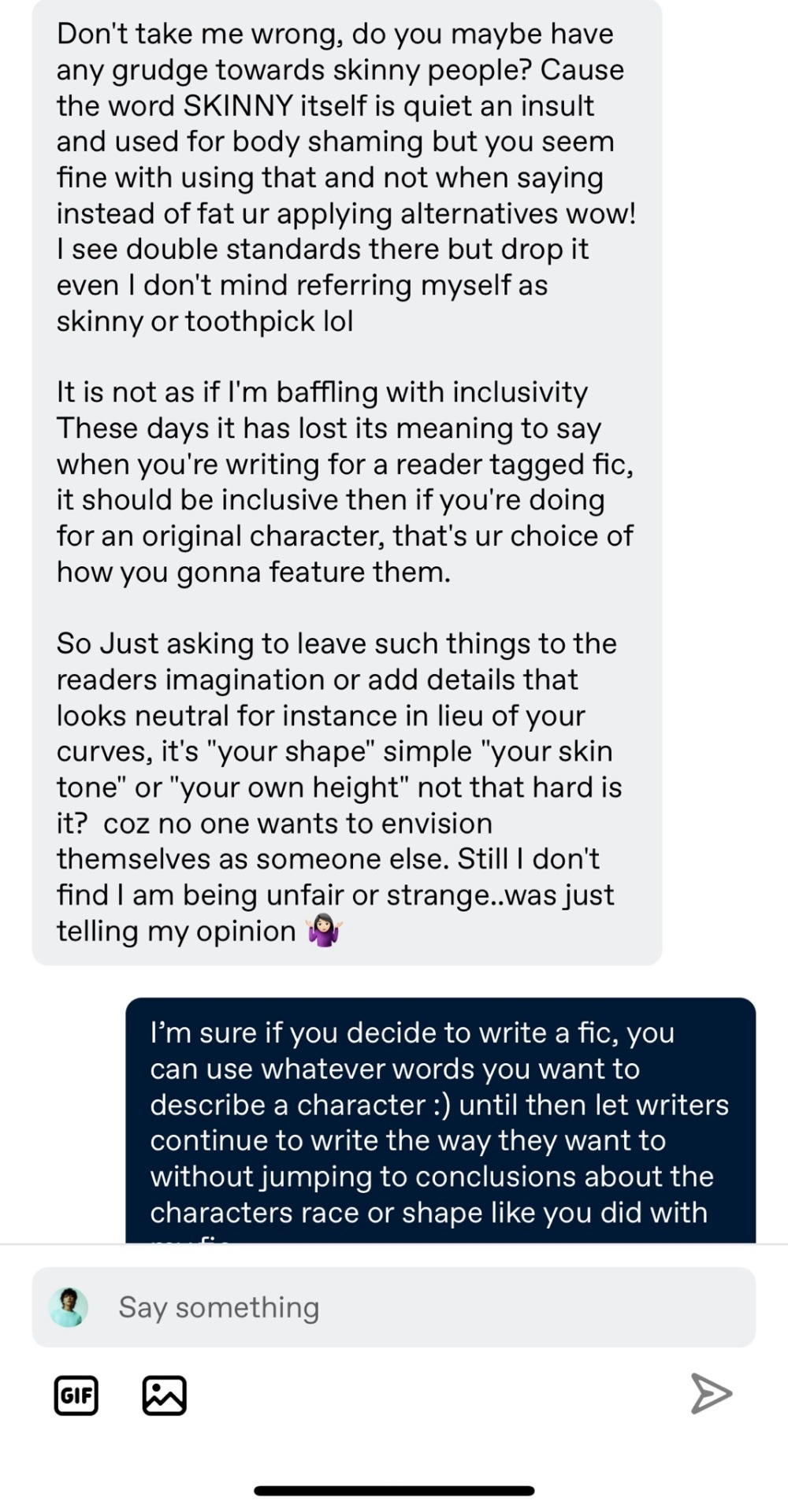
finally this strange need to be a victim by saying “do you have a grudge against skinny people” literally BAFFLED ME, bc I went on their blog where they reblogged a post about how skinny people are ignored LIKE WHATTTTT
I’ve been reading fanfiction since I was 13 in 2014 and I could never read a story about a brown character but there were a billion carbon copy fics of a blonde/ginger, skinny main character. I would read them bc what other option did I have? that’s why this upsets me because one)
I don’t ever specify my character’s race/color/weight so for someone to make assumptions and then message me trying to ask me to change the way I write is weeeeeirrrrdddd. I’m not a professional, I write for fun and if there are blogs out there that only specifically write for poc or heavier set people, DONT READ THEM IF YOU DONT LIKE THEM
suddenly all these readers want to delegate how a writer creates a story when it used to be that we had readers BECAUSE they liked the way we wrote, not bc they want to change it
this is what poc people have gone through for yearrrrrrrrrrrrrsssssssss:
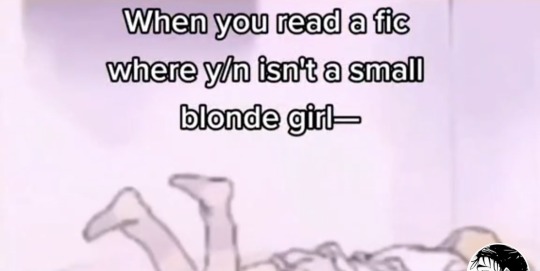

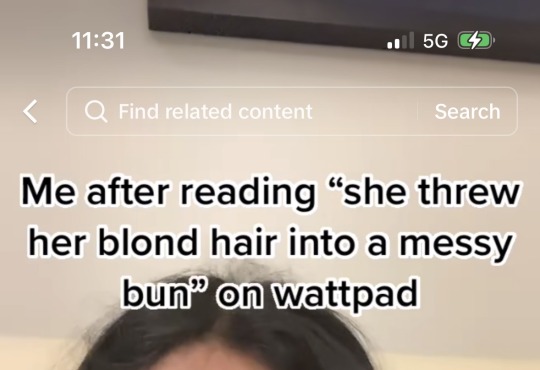

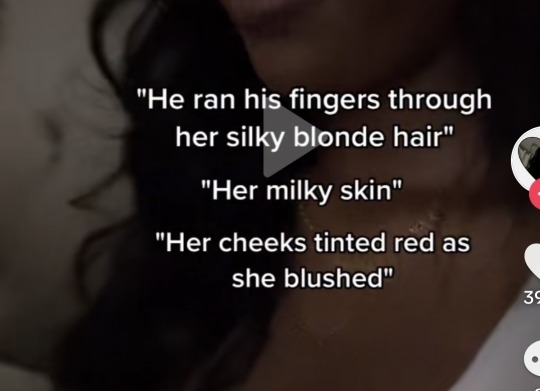
and like I said, I try and be inclusive and never describe someone’s physical traits unless it’s in the most indirect way but I completely respect and acknowledge writers who do specifically make works for poc readers or readers with a certain type of body type [that was never written before in fanfics]
I also don’t care if people think I’m rude, I’m literally Mexican with tan skin and black hair and if I wanted to write works that’s “not inclusive to white/skinny people” I would’ve done that by now, but that’s not my goal so pls don’t try and paint my writing to be for one target audience
84 notes
·
View notes
Note
about your last post: i think alot of the players of the fl community just have a very strong stereotype of what people of certain ethnicities might look like, and when a character of that race, ethnicity, or religion doesn't look like their idea of what they envisioned, they ignore it or claim it as a form of racism (see also: discussions surrounding may from motr)
This is a little different, because almost none of the hate that I've seen was towards the character design – except for May, YES, and for some reason Griz (whose more modern not-Victorian-lady style is directly relevant to her story and personality, not developers’ oversight of anachronisms! Just why there is this unexplicable malicious urge to make them look careless or ill-intentioned when they’re one of so very few game studios who are honestly striving to be the opposite?..)
It’s usually about the plot and worldbuilding, and it’s repeatedly getting twisted out of context. For example, FL's and MotR's wonderful cultural and spiritual diversity is completely ignored in arguments regarding it. Evil writers had the audacity to acknowledge the existence of just one more religion, and suddenly nothing else matters, now it's bad by default (exactly just like other games’ players always get mad at extra romance options because "how dare you imply that my character may be queer", hello BG3). Such intolerance to any mention of a particular group/identity definitely isn't what I expected from the fanbase of a setting that is known for its inclusivity, that’s why it really baffled and saddened me.
So I’m not surprised anymore that so much more gets deliberately skewed or ignored too. As always, people don't want to give evidence-based criticism and fair analysis; they simply want to justify their spite.
I wish just for once fandoms would be dedicated to actually loving and enjoying something together instead of endless hostility towards each other and the authors and even the canon itself...
2 notes
·
View notes
Text
Week Four: Canonicity
Othello, William Shakespeare, 1604
1. Canonicity: Why do you think this text is considered to be part of the canon? Who benefits or gets marginalized from an inclusion of this text in the curriculum?
Well, it’s Shakespeare, for the obvious thing. I guess pragmatically speaking that’s not a sure factor -- you don’t see Troilus and Cressida on too many high school reading lists -- but as authors go, he’s about as canonical as it gets. More importantly, maybe, is that it’s one of the four “major” tragedies (Hamlet, Macbeth, King Lear, Othello), which kind of puts it in a second, nested canon within the first one. Not being a student of Shakespeare historiography, I can’t tell you exactly how either of those canons came to be. I’m enough of a sell-out to the old guard to say that it probably has something to do with Shakespeare in general, and those plays in particular, being really, really good. But excellence doesn’t guarantee immortality, and I recognize that historical forces have been at work on the perception of Shakespeare for four long centuries.
As for who benefits or gets marginalized... that’s a tough question. And it seems like it depends how it’s taught, right? If you held it up as some abstractly, metaphysically great work of WESTERN LITERATURE, then surely the Harold Blooms of the world benefit from the lasting cultural capital. In that case, it seems likely that anyone who didn’t like it, or didn’t understand it, would feel marginalized. But if you taught it in its own context, as a created thing with particular flaws and virtues, subject to the same individual judgments as any work of art, then I’d like to think most people would either take something valuable from it or feel accepted in their decision not to.
2. Contexts: What version of a given historical period does this text tell? How would the narrative differ if someone from a different race, gender identity, ethnicity, or class wrote it?
Well, again, not being an expert on Elizabethan England, there’s not too much I can say about the relationship between the play and the reality it portrays. It certainly suggests interesting things, like that Black men could serve as generals in the Venetian army, but I’m hesitant to draw any conclusions without better historical footing.
The second question seems just as hard: we certainly can’t claim knowledge of Shakespeare’s gender identity, and his class seems like a (somewhat) open question. As for what it would look like had it been written by someone of another race, while it’s a rich problem, it seems like a hard one to solve solidly regarding an era that a) predates so many of our more familiar racial constructions and b) offers so few English examples of non-White writing that we might hold up in comparison.
3. Literary Elements: What cultural knowledge would someone have to have in order to understand the literary elements (symbols, theme, characterization, etc.) of this text? If the text includes minority characters, are these characters complex or stereotypical?
Someone would certainly need some knowledge of Elizabethan culture and idiom (the stained bed-sheets come to mind, as do all the references to horns), but I feel like that’s knowledge that has to be built from the ground up for anybody, these days. Maybe students from wealthier or more classically-educated backgrounds would have more of that building done by the time they came to class, but it would still be a matter of who’s spent the most time studying the material. Nobody gets a leg up because they come from a family that speaks Elizabethan English at home. I hope.
And minority characters -- ay, there’s the rub. Because traditionally, and in the view of the canon itself, Othello is a prototypically complex hero -- all the tragic ones are. I certainly agree that it’s hard to read (let alone see) the play without getting a sense of his deep and troubled personhood, but I’m not sure that’s a complete answer to the question. What I’d want to ask, more than anything, is whether a character can at the same time contain human complexities and racial simplicities -- whether he can be real as a man, or as a person, but stereotypical as a Black man, or a Black person. Yet even here, it seems like so much cultural context is required. Othello might fit some of our standards of racist stereotype (most notably in his passion-killing of the White, “pure” Desdemona), but we still have to ask how those standards have changed since 1604, and, for that matter, how those standards operate and are commented on in the play as a whole. I can’t answer those questions, but I would sure pose them to a class.
4. Teacher/Reader: How does your own identity, ability, sexual orientation, age, religion, socioeconomic status, race, etc. shape your reading of this text? In other words, how does your own positionality/privilege affect your perception of this text's value?
Tricky question. As a White man, and a White man in an English major, I’m probably propped up in my love of Shakespeare by all sorts of unstated and vaguely sinister forces. If there is such a thing, I’m definitely the type of person who’s “supposed” to like Shakespeare. Most of the people walking around rambling about his genius look like me, and talk like me, and maybe more importantly look and talk like my dad, and my dad’s friends. Shakespeare is an accepted part of a world that I’m also, more or less, an accepted part of. And so that will taint any statement I might ever make about how just obviously good and fun and moving his work is.
But then, I feel like this question is made a lot more interesting by how old Shakespeare is. He’s had time to get claimed, in a pretty deep way, by cultures and cliques he could never have anticipated, and that possibly he wouldn’t have belonged to. I think there’s value in the approach of taking Shakespeare as this monolithic, culturally-created figure to be pushed back against and deconstructed. But I also think there’s a kind of rebellious value in trying to strip away those accreted layers of critical snobbery, and to find beneath them the great, imperfect work of a funny, thoughtful guy writing plays for the common people. Probably, hopefully, a teacher can do both.
5. Assessments: Would a summative assessment on this text allow students to think about ways to enact social change beyond the classroom? Would it allow them to move past the four corners of the text and even a personal connection with the text to understand how this text has greater significance to current issues and events?
This is a little bit of a tangent, but I was thinking about this yesterday, and I had the idea that what I resent about that CCSS standard is less the suggestion that students “stay” in the text than the suggestion that any text has only four corners. In my ideal world, any text worth studying is worth studying because it’s expansive enough to contain our world, in the same way that our world contains it. So rather than treat it as a static object, to spend some time in and then compare to the dynamic world around it, my hope is that students could treat any text -- Othello especially -- as a thing that already is about the world around them.
And if I can get that point across, it seems like options abound. Because Othello already is about justice, and race, and White perceptions of Black feeling, and violent structures, and jealousy about the body, and domestic violence, and hyper-masculine blindness, and on and on. I’ve only ever gotten to see one professionally-produced Shakespeare play, and it was this one, at the Oregon Shakespeare Festival in 2019. Iago was cast and dressed as the spitting image of neo-Nazi Richard Spencer, and I don’t think a single person left that theater imagining Othello as anything less than searingly contemporary. I hope that a good teaching of this play, and a good summative assessment, would do the same thing -- and make any conversation about its “greater significance to current issues and events” sound understated.
0 notes
Photo
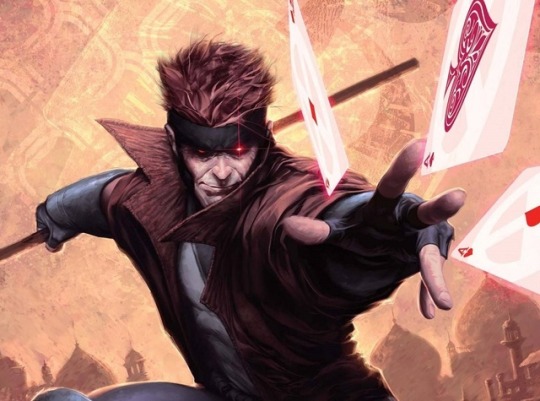
New Post has been published on https://www.pointofgeeks.com/gambit-thieves-assassins-casting-breakdown-for-upcoming-x-men-spin-off/
GAMBIT: Thieves & Assassins Casting Breakdown for Upcoming X-MEN Spin-Off
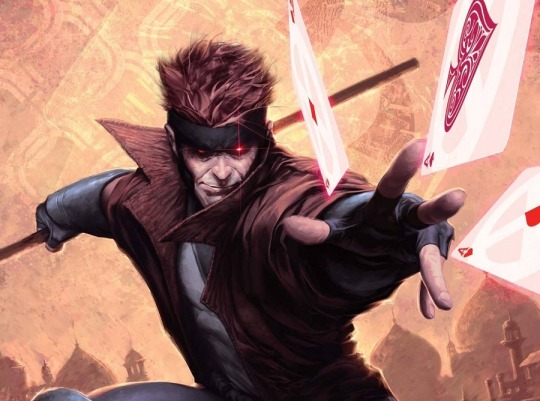
There has been a lot of movement over at 20th Century Fox in regards to their X-Men cinematic universe that continues to blaze ahead in many surprising and inspired ways. Yet, no project can claim to be as unlikely as the Gambit film, which has managed to find new life over on the studio lot.
youtube
The upcoming X-Men spin-off movie still has Channing Tatum officially signed on as the lead, as well as in the role of producer on the movie. It’s equally encouraging that the film found a new director in Pirates of the Caribbean’s Gore Verbinski, following the musical chair departure of previous directors, Rupert Wyatt and Doug Liman. Last week the studio planted their flag with the announcement of a February 2019 release date, which signals that pre-production is firmly in motion and now we have obtained the latest on the development of Gambit.
A few days ago Omega Underground uncovered audition tapes for the Gambit movie, which is covertly going by its working title of Chess. The tapes seemed to indicate that the producers are looking to cast the female lead and Gambit’s love interest in the upcoming movie, Bella Donna Boudreaux. Back in 2015, the trades had reported that Léa Seydoux (Spectre) had won the role, but with a new director and script in tow, the role is currently being recast for the spin-off film. However, this was a clear indication that the casting process is moving full speed ahead, which was a impetus for further investigation.
Bella Donna isn’t the only role currently being cast and gotten some info that may shed a little more light on the direction of the picture. Casting for Gambit is steaming forward and we have gotten some timely character breakdowns that should give our best indication yet of what direction the production is moving in. As is usual, the true identity of the roles have been obscured with code names, so we simply gave our best guesses on who from the world of Marvel Comics may be joining the upcoming movie. Take a look:
[MARIYA] Female, Caucasian, mid 20s – early 30s. Must be 5’11’+. Tall, stunning and willowy, a Parisian glamour girl. Must speak fluent French or do a perfect French accent. ROLE REQUIRES SEQUEL OPTIONS.
This is clearly for the role of Bella Donna Boudreaux. She is the love interest and inspiration for Gambit in his younger years and their relationship has enough source material to fuel a trilogy on its own. In the comics, the character goes in some frightening and unexpected directions, which should keep audiences off guard.
[LEWIS] Male, any ethnicity, 40s-50s. Elegant and intelligent. An appealing entrepreneur with an unexpected dark side. ROLE REQUIRES SEQUEL OPTION.
According to Splash Report the role of Dr. Nathaniel Essex, aka Mr. Sinister, is Daniel Craig’s role to refuse. We haven’t gotten word on who else may be on the shortlist, however the inclusion of the character has the potential to change the entire complexion of the X-Men universe.
[NASH] Male, any ethnicity, mid 20s-early 30s. A potent threat. Heir to his mother’s business. Malevolent.
This role seems pretty straight forward, as it’s most likely Julien Boudreaux. He is the brother to Bella Donna, who comes into direct conflict with Gambit when he challenges the mutant to a deadly duel. During their confrontation, Gambit’s mutant power manifests which leads the future X-Men closer to his destiny.
[MAGNUS/WOLFGANG] Male, authentic French. 40s. A French criminal. Must speak fluent French.
This role could potentially be that of Bella Donna’s father, Marius Boudreaux, the one-time leader of the Assassin’s clan. He helped to engineer the arranged marriage between Remy and Bella Donna, which was meant to spur a truce between the Assassins and Thieves. The character is thinly sketched in the comics and would potentially have a small but pivotal role.
[FRITZ] Male, any ethnicity, 40s-50s. A professional thief. Charismatic con-artist. Warm hearted but untrustworthy. ROLE REQUIRES SEQUEL OPTION.
This role is a great fit for Gambit’s mentor and adopted father, Jean Luc LeBeau. The master thief found Remy as a young pickpocket on the streets of New Orleans and quickly took him under his wing as his own. Jean Luc is responsible for much of the flair that the future X-Men goes on to be known for, including a proclivity for trench coats, as well as training Remy with his trademark weapon, the bo staff.
[WESLEY] Male, any ethnicity, mid 20s-mid 30s. Aspirational but weak minded. Soulful and sensitive. ROLE REQUIRES SEQUEL OPTION.
This role seems to be a great fit for Emil Lapin. Lapin is a cousin and lifelong friend of Gambit, who is a master thief and one of the crew’s most capable engineers.
[BORIS] Male, mid-20s-30s, Hispanic. Tough, menacing, with a dangerous, craggy character face. ROLE REQUIRES SEQUEL OPTIONS.
From the description of the role, the production is seemingly searching for the next Edward James Olmos. If we are following the comic’s origin story, Boris could actually be the Pig, a mutant slave trader who comes into conflict with Gambit as a kid. It would seem that the Pig could also have direct connection to Mr. Sinister as well, judging by his line of work.
[JOE] Male, any ethnicity, 30-50 years old. We are looking for actors 5’6” and under. He’s a gun for hire. He is the black sheep of his family. Not from good breeding but from a working class family. Short. Puck-like, with an interesting character face. REQUIRES SEQUEL OPTIONS.
Could this actually be the infamous Puck from Alpha Flight? It’s unclear how interconnected the spin-off will be and if it will be opening the door to the Canadian superteam, however the description is very “inside baseball” and presumes that the casting director has in-depth comic knowledge. However, there are literally hundreds of characters that could fit that description.
[PIA] Female, Native American, early 20s. Street, tough, punk. ROLE REQUIRES SEQUEL OPTIONS.
Could this be the first crossover for the New Mutants? It would seem to be a good fit for Dani Moonstar and could also be a signal that the Gambit movie could have an edge to it. Actress Blu Hunt was heavily featured in the recent trailer for The New Mutants and her possible inclusion could help the interconnectivity of the next wave of Fox’s X-Men films. However, this is far from a lock.
[CARISSA]Female, mixed race, 10-12 years old. Ethereal and other-worldly. Very expressive. ROLE REQUIRES SEQUEL OPTION.
The role of Carissa seems sneakily similar to Candra, a mutant whose powers of telekinesis can actually awaken the mutant gene in individuals. If this is indeed that character, Candra has an important function in helping to realize certain characters’ potential in the storyline from the comics. However, it seems that they are casting young for the role, so she could be a reach.
Next we have a collection of roles that seem to fit directly into the conflict between the Assassin and Thieves’ Guild. Both warring guilds have a variety of supporting characters that are either friends or blood relatives of Gambit or Bella Donna, along with other mutants that weave their way into the narrative in the comics. So it would seem likely that characters such as Jacques LeBeau, Henri LeBeau, Etienne Marceaux, and Mercy LeBeau, all fit the roles being cast below.
[MRS. STANTON] Female, Caucasian, 50s. An elegant older woman with a French accent. Must speak fluent French.
Possibly the mother of Bella Donna and a de facto head of the Assassin’s Guild, who runs her criminal empire with her literal family of killers.
[WILHELM] Male, any ethnicity, 30s. Dangerous street criminal. Protective and loyal to his family. Intensely loyal and violent.
[GARY] Male, any ethnicity, mid 20s-early 30s. A little simple; dim-witted and passive.
[NONA] Female, any ethnicity, mid 20s-30 years old. Uptight, corporate, vicious, sexual. ROLE REQUIRES SEQUEL OPTION.
[FRANKLIN] Male, any ethnicity, 20s. An appealing street kid. ROLE REQUIRES SEQUEL OPTION.
[BEN] Male, any ethnicity, 20s. Just reaching adulthood. A street kid, a disaffected outsider, an orphan. ROLE REQUIRES SEQUEL OPTION.
[HOWARD] Male, Caucasian. 50s. A refined European mobster who speaks fluent French.
[VERA] Female, any ethnicity, mid 20s-early 30s. Beautiful, smart, tough, fiery and unpredictable. ROLE REQUIRES SEQUEL OPTION.
In the comics Remy LeBeau, aka Gambit, grew up a master thief in the New Orleans bayou. His origin story is a reworking of Romeo and Juliet, set against the seedy underworld of Assassins and Thieves. LeBeau gets involved with an heir to the Assassin’s Guild in an arranged marriage that sets a bloody war between the factions into motion. Splash Report previously reported that the film’s plot will also involve a huge heist that Gambit is forced to perform, due to the influence of Mr. Sinister. A mutant geneticist who has made his name by experimenting on mutant-kind and whose history intertwines with many popular X-Men.
However, even with all of this casting news, there still isn’t word on the tone or approach to Gambit. The success of Logan and Deadpool, along with the growing buzz for the unorthodox adaptation of The New Mutants has given Fox’s X-Men universe new life. Gambit’s story doesn’t need an Avengers’ level of scale and has the opportunity to operate on an emotional and dramatic level that other X-Men movies might not have lent themselves to in the past. With the film’s release date set just a little over a year away, we will be sure to bring you much more on Gambit.
Gambit is set for release on February 14th, 2019.
What do you think of the latest on Gambit? Let us know on the comment boards, Facebook, Instagram, and Twitter! Share our stories by simply clicking your favorite social media below!
Source: That Hashtag Show
Art by: BossLogic
#Bella Donna#Channing Tatum#Dani Moonstar#Emil Lapin#Gambit#Jean Luc Lebeau#Marius#Marvel#Mr. Sinister#Pig#Puck#Spin-Off#X-men#X-Men Universe#Movies / TV#News/Rumors#PoG EXCLUSIVE Scoops
1 note
·
View note
Text
Response: The Representation of Sexuality and Relationships in Games
Games have a unique opportunity when creating characters because they don’t have to rely on physical acting so they can create a character to be any race or gender and find the voice actor that fits. The issue with this is that developers tend to create characters that appeal to what they believe is their largest audience, so straight white males are a popular character for games. It seems like deviating from the norm and introducing alternative character types opens up a world of fear that it will polarise too many players. For instance, 2013 was branded as the year of the female protagonist because there was a total of 3 big games announced that had a female protagonist: Tomb Raider, Bayonetta 2 and Beyond Two Souls, then Call of Duty decided they would include female characters in their upcoming multiplayer for Call of Duty: Ghosts. The industry and players rejoiced that finally there would be more females in games, well, the male ones did at least. It seems that people in the majority think that having one or two characters that fit into a minority automatically makes everything more diverse. A few gay characters here, a female protagonist there and maybe just for kicks they won’t all be white. That’s not how diversity works. Having one character in one game that fits into a minority doesn’t suddenly eradicate the massive amount of sexism, racism, homophobia or transphobia that exists. With realism and immersion becoming more popular we see some developers scrambling to implement romance systems and making the most stereotypical LBGTQ+ characters ever seen, like repeating the ‘year of the female protagonist’ with less effort. The problem is you can’t really get away with butchering things that we experience in real life without anyone noticing.
Developers don’t seem to know how to handle increasing the amount of LBGTQ+ characters in their games, instead of looking at the competition and standing out from the crowd they seem to rely on the same old character types. A lot of games work with a pre-made character, they tell the story of a character the studio has created that the player will follow on their journey. They tend to have a limited opportunity to express much in terms of sexuality and relationships due to the story taking priority over the few characters that the player interacts with. But it seems that they constantly waste the few opportunities they do have by choosing the majority over and over again. Even games with large casts with the option to pursue a relationship arc seem to struggle with sexuality. Take Bioware’s massive RPG franchises Mass Effect and Dragon Age, even though their romance subplots are a big draw for players, they still keep the homosexuality to the bare minimum. One gay option is available for each gender, one bisexual option and the rest are either straight or non- romanceable. It seems a wasted opportunity to have such a strong system and then limit the options for any players that want to create an LBGTQ+ character. As levels of realism in games increase, so should the diversity of the characters we play.
In an interview with games journalist Kate Gray, she highlighted how allowing players freedom and full immersion are important to players “If games want to have full immersion, and are already aimed at adults, I think it’s hugely important. I don’t think every game needs sexuality and relationships … but I also think that, if you’re going to include it, it should be done properly… Romance is so personal that it’s vital to have options that cover the majority of your players.” This is all very true, not every game you play should have you romancing everything that moves or trying to tackle the massive issue of sexuality but maybe some more should. If even one game this year attempts to portray such issues in a way we’ve never seen, we’d notice a huge difference in how we speak about it.
The intimacy of relationships may be hard to translate into a 40-hour game and not just feel like a lecture on how to they should work but a few developers appear to want to avoid even trying to portray something real. Bioware once again comes up short in the representation department. Simply pick the right options in conversation, do their loyalty mission and you will unlock the ultimate ‘prize’ for game relationships – sex. In the later entries in their two biggest franchises, Mass Effect and Dragon Age, there is an attempt to portray platonic relationships between the player and the NPC characters but it still seems to suggest it won’t take more to become more than friends. But as Gray pointed out, that’s not how it works “Friendship doesn’t have a “win state” like romance does - sex - and though I obviously disagree with sex being a “prize”, I can see how it’s easy to gamify. That doesn’t exist with friendship, which is more of a sliding scale.” But for games, the focus is always set on winning the prize in every category including relationships. There are varying degrees of these prizes of course: for Mass Effect, it is a sex scene while in Harvest Moon it is a baby. Even though it may seem odd to compare a SC-FI action RPG to a farming game, their idea of using “friendship as a step to romance” is always the same - do or say the right thing for a little while and you will win that prize every time. That may make perfect sense for games, they aren’t exactly the most realistic forms of entertainment, I can become the ultimate warrior or a highly skilled spy by sliding a disc into the tray but just because people want to escape when playing a game doesn’t mean they don’t want something real in it. Expressing ourselves is a massive part of life and games, we can customise the character’s hair, voice, clothes, skills – the list is endless really. Sometimes though, you may want to make a character that reflects you as a person and without something as basic as sexuality you won’t really ever get to have that choice.
There are so many players that are underrepresented in games today as developers still play into the white straight male-centric view that people have of the world. So many people are LBGTQ+ these days that the choice to exclude them makes no sense. Developers are missing out on strong characters, world building and storytelling because the fear of being boycotted by the loud minority of homophobic, transphobic, misogynistic and racists who will make it their mission to have your game tank is stronger than the need to represent people who will still pick up your game and play it.
Fable is a great example of a game that implements sexuality so subtly you might not even notice it. When you are walking around in any Fable RPG you might notice some hearts above NPC’s heads, they indicate that they are in love with you. Look closer and you will find some above both women and men, in the second and third instalment pulling the left trigger will bring up some more information and you will find that Albion is filled with gay, lesbian and bisexual people. It makes the world feel more real and although Fable doesn’t have a big focus on relationships, it allows the player the choice and that is the big difference. It is done in a way that you can completely ignore it and just focus on the main story or you can decide to start a family with whoever you choose.
In the past 50 years expressing yourself as an individual has slowly become an integral part of life, it allows people a freedom that was never explored before. Dye your hair, dress how you like, listen to whatever music you like, date who you want to. It has all become so common place that most people wouldn’t bat an eye at someone with neon blue hair walking down the street. However, we are still faced with bigotry in regards to race, gender and sexuality in a world that preaches acceptance. Where this acceptance has flourished is in the forms of escapism we live our lives surrounded in. TV, movies, music, the internet and games all offer a few hours of being cut off from the world, of experiencing new things and broadening our horizons through someone else’s eyes. Take RuPaul’s Drag Race as an example of a TV show that opened people up to the niche world of drag. It showed how much of a market there is for simple expression of self in a time where people are still attacked for who they love or how they dress. And since Hollywood and big TV companies crumble under the protests of close-minded people, wouldn’t games be the perfect place to allow someone to express themselves within a fictional world? To experience the struggles faced by people under attack for being themselves through the safety of a computer screen? It is sad to see such an amazing industry that can create entire fantasy universes shy away from problems faced by so many of their consumers.
That being said, games are a wonderful thing. They tell stories, create universes and let you escape into a fantasy at the push of a button. But they lack in an area that has become so important and so fundamental in the last few years that they are quickly coming under fire from their dedicated players. Representation is an overlooked issue in every entertainment industry these days that the excuses we hear are becoming so predictable it’s almost laughable. The highest rated TV shows and movies this year? Probably starring the same straight white guys we’ve been watching for years. The artists taking home the most awards at the big music events? I can name the top five of them without even trying to think about it. This year’s biggest games? Well hopefully in the industry that creates its own stars, maybe we’ll get to see a few surprises this time around. It isn’t that every game needs to have a gay, trans ethnic lead to be inclusive – far from it in fact - but maybe if just here and there we got something a little different than what we’ve seen a million times before, then we can be proud to say that we include people for who they are when everyone else is pretending there isn’t an issue.
References:
Please note that throughout this response I didn’t access outside material other than game names and my interview with Kate Gray. Therefore these references are purely games that I mentioned.
Tomb Raider. 2013. [computer game]. Crystal Dynamics
Bayonette 2. 2014. [computer game]. Wii U. Platinum Games
Beyond Two Souls. 2013 [computer game]. Quantic Dream
Call of Duty: Ghosts. 2013 [computer game]. Infinity Ward
Dragon Age. 2009. [computer game]. Bioware
Mass Effect. 2007. [computer game]. Bioware
Harvest Moon. 1996. [computer game]. Super Nintendo Entertainment System. Amccus
Fable. 2004. [computer game]. Xbox. Lionhead Studios
RuPaul’s Drag Race. 2009. [tv show]. World of Wonder
0 notes